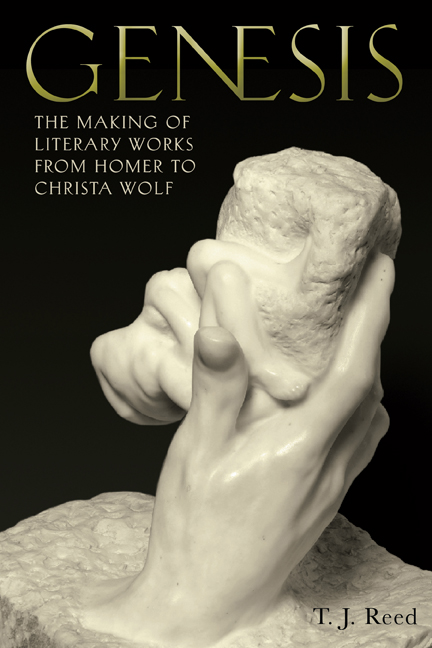Book contents
- Frontmatter
- Dedication
- Contents
- Note on Quotations and Translations
- Preface
- Introduction: Processes
- Part I Antiquity
- 1 Homer's Audiences: Shaping the Iliad (and the Odyssey)
- 2 Fourfold Genesis: The Bible between Literature and Authority
- Part II Early Modern
- 3 An Alphabet of Experience: Montaigne
- 4 Beginner's Luck: Shakespeare's History Cycles
- Transition—Tradition
- Part III Goethe
- 5 Cross-Purposes: Goethe's Faust
- 6 Occasions: Goethe's Lyric Poetry
- 7 Live and Learn: Werther and Wilhelm Meister
- Part IV Nineteenth- and Twentieth-Century German
- 8 Writing on the Run: Georg Büchner's Revolutions
- 9 “The Best-Laid Schemes…”: Thomas Mann Unplanned
- 10 Description of a Struggle: Kafka's Half-Escape
- 11 Atomic Beginnings: Brecht, Galileo, and After
- 12 Knowing and Partly Knowing: Paul Celan's Mission
- 13 Christa Wolf: A Fall from Grace
- Afterword
- Notes
- Bibliography
- Index
10 - Description of a Struggle: Kafka's Half-Escape
Published online by Cambridge University Press: 16 September 2020
- Frontmatter
- Dedication
- Contents
- Note on Quotations and Translations
- Preface
- Introduction: Processes
- Part I Antiquity
- 1 Homer's Audiences: Shaping the Iliad (and the Odyssey)
- 2 Fourfold Genesis: The Bible between Literature and Authority
- Part II Early Modern
- 3 An Alphabet of Experience: Montaigne
- 4 Beginner's Luck: Shakespeare's History Cycles
- Transition—Tradition
- Part III Goethe
- 5 Cross-Purposes: Goethe's Faust
- 6 Occasions: Goethe's Lyric Poetry
- 7 Live and Learn: Werther and Wilhelm Meister
- Part IV Nineteenth- and Twentieth-Century German
- 8 Writing on the Run: Georg Büchner's Revolutions
- 9 “The Best-Laid Schemes…”: Thomas Mann Unplanned
- 10 Description of a Struggle: Kafka's Half-Escape
- 11 Atomic Beginnings: Brecht, Galileo, and After
- 12 Knowing and Partly Knowing: Paul Celan's Mission
- 13 Christa Wolf: A Fall from Grace
- Afterword
- Notes
- Bibliography
- Index
Summary
The Wound Breaks Open
AS THESE STUDIES GO, Kafka is a case in the diagnostic sense. Perhaps not just all unhappy families, as Tolstoy wrote, but all unhappy individuals are unhappy in their own way. Kafka's misery was complex, each strand having its own pathology and paradoxes: a deep feeling of physical and psychological inferiority and of exclusion from common human contact; dissatisfaction with his body and appearance, although he was tall, good-looking, and always elegantly dressed; uneasy family relations, especially with his dominating father, a powerful self-made businessman; a feeling that he lived among but not in his family, stranger than a stranger, lonelier than Robinson Crusoe on his island, yet also not wholly belonging to the traditional Jewish world, or Zionism; a sense of intellectual failure from the time of his schooling onwards; the frustration of an unloved office job, and the responsibility for a rashly launched further family enterprise, both of which consumed time and energies that might have been used for writing.
Writing was a yearned-for compensation, but also a further source of misery when, as so often, it failed to flow. Even so, it dominated his life, in childhood as a premonition, later as a hope, later still as despair. Was he a writer? He was sure he was nothing else. Reflections on that status and attempts to achieve it fill his diaries. Rather than everyday events, they record his creative starts (overwhelmingly unsuccessful) and the ebb and flow of his self-confidence. The above chapter title, borrowed from an early collection of his sketches, exactly fits Kafka's life-long struggle to prove himself.
Not that the creative fulfillment Kafka hoped for would have made for a happy life. As a writer, he would still be left with loneliness and exclusion. An early piece, the delicate prose-poem “An unhappy bachelor,” movingly foresees the realities of a solitary life. Marriage and family were in his eyes an ideal fulfillment, just not for him. He came as near as being engaged—twice—to Felice Bauer, and over six years wrote her 400 eloquent love-letters (they make 750 closely printed pages) but twice broke off the engagement. His writing routine, deep into the small hours, would have made him an unsociable husband.
- Type
- Chapter
- Information
- GenesisThe Making of Literary Works from Homer to Christa Wolf, pp. 191 - 208Publisher: Boydell & BrewerPrint publication year: 2020



